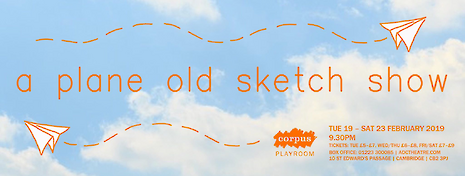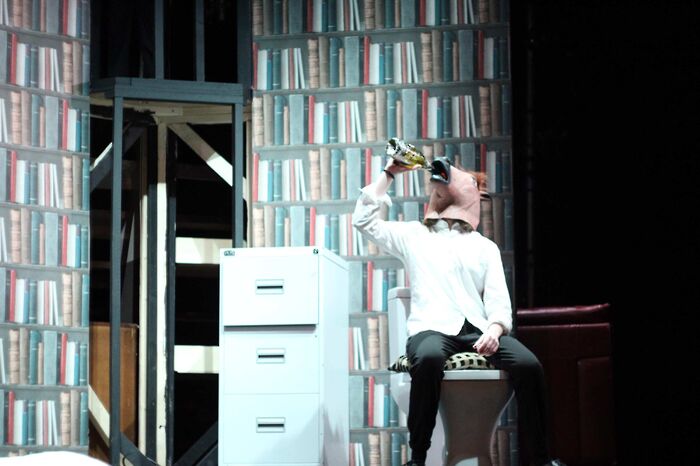A Plane Old Sketch Show review
This refreshing response to the Cambridge comedy scene has a polished feel, but still relies on formulaic jokes and occasionally misses the mark

‘A Plane Old Sketch Show is a show that is entirely gimmick-free. It has grown bored of the usual tropes and tricks of sketch shows at the moment and aims to provide a show that is entirely free of artifice and silly stunts.’ So claims the show’s Camdram description. Upon arrival, you’re greeted by the cast, half in-character, half themselves, and note the bare stage, lacking any decoration bar three black cubes across its middle. It emerges that the production budget has been spent on merely a few sheets of paper, a too-small Taekwondo outfit, and these versatile cubes. This Fringe-esque set up obviously works to force attention on the performers, surviving solely off the strength of their writing and characterisation rather than on props and visual aids.
I disagree that the show is ‘gimmick free’ just because it has been stripped of projection, and, for the most part, furniture and music. It would be fair to say that most jokes landed (no pun intended) but also that most jokes were formulaic and conventional. The show relies far too heavily on the use of aeronautical puns, leaving the audience groaning as much as laughing. The overall comedic style is very much to heighten reality, to push a trope into absurdity, which is pleasantly funny but not remarkably so.
Nonetheless, the audience instantly ‘got on-board’ with the concept because of the cast’s unerring charisma. The delivery of Griffin Twemlow’s vigorous Britney choreography which begins the show evokes the opening credits from ‘The Armstrong and Miller Show’, with all performers keeping a straight face as their arms flail beside them. A joke intended to scrutinise how ‘Love Actually’ situated itself in response to the 9/11 alienated the audience as the reference was too-niche to be widely recognised. To those left out of the loop, it might easily have read as a joke at the expense of the event itself, and therefore unnecessary and distasteful. The team should defend their use of this sketch, and either make the film reference more explicit or cut it completely. This was completely off-brand with the otherwise well-pitched humour of the show, which proved it could dabble in dark humour as we see in Daniel Bishop’s ballad, ‘Co-Pilot in a Coma’.
"All three command attention on stage, without any lapses in confidence or even the faintest hint of jitters."
It’s immediately apparent that the three have great working chemistry. The show was completely ironed-out and slick on opening night, with Jane Li, technician, also hitting all the right cues and, although the use of music and blackouts was minimal, the times where they were deployed were effective and striking. However, it felt like each member’s personal comedic styles weren’t always in unison, leading to a couple of unsuccessful tonal shifts between sketches that had comedic potential, but departed too far from the tone of the preceding sketch. Bishop’s less-conventional style experimented with pushing ideas and characters to their limits, finding the humour and then reaching beyond it. Alongside Friso de Graaf and Gabriel Barton-Singer, who opt for more ‘conventional’ sketch structures - those which leave us hanging for a punchline or twist - Bishop was refreshing but not always successful in his approach as if the audience were little prepared for these sketches when they came about. His is a unique style that is rare and under-appreciated on the Cambridge scene, and would perhaps benefit from more airing than is allowed in this sketch show.
I was surprised by how well the transitions worked without more technical assistance, how clear each character was as they recurred throughout the show. Barton-Singer deserves special note on this account. He captured awkward moments of British politeness, of confusion, of different aged characters without ever becoming lazy, indulgent or unclear. Likewise, de Graaf proves himself a versatile performer but demonstrates his skill more as an ensemble player than a leading character actor, something not to be undermined. All three command attention on stage, without any lapses in confidence or even the faintest hint of jitters. They conduct themselves with the utmost professionalism, and their enjoyment of the act is contagious.
Pitching the show as a response to other shows - something that promises to be different and bare - draws attention to its own theatricality. There is something meta about this choice, which accompanies the cast’s scripted breaking of the fourth wall. They mark their scene transitions with the whoosh of their arms as if acknowledging that this is all just a bit, well, naff. It’s like they’re inviting us in and saying: ‘Hey, do you know what’s funny? Being funny.’ And that’s all in the title: it’s about planes, and it’s a plain format (and it will over-rely on puns). This is an amusing show, which will have you giggling for the full hour, sometimes at the genius of the sketches, but mostly at the sheer audacity of these players in putting on a show about planes.
 News / Caius mourns its tree-mendous loss23 December 2025
News / Caius mourns its tree-mendous loss23 December 2025 Comment / Yes, I’m brown – but I have more important things to say22 December 2025
Comment / Yes, I’m brown – but I have more important things to say22 December 2025 News / Clare Hall spent over £500k opposing busway 24 December 2025
News / Clare Hall spent over £500k opposing busway 24 December 2025 Interviews / Politics, your own way: Tilly Middlehurst on speaking out21 December 2025
Interviews / Politics, your own way: Tilly Middlehurst on speaking out21 December 2025 News / King appoints Peterhouse chaplain to Westminster Abbey22 December 2025
News / King appoints Peterhouse chaplain to Westminster Abbey22 December 2025









